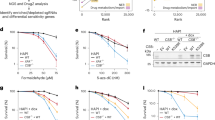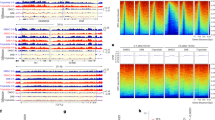Abstract
TRANSFER RNAs are modified extensively after their primary synthesis is completed. Such modifications, which are necessary for the proper functioning of tRNA in protein synthesis1–3 and transcriptional control4, are achieved by enzymes which include the tRNA methyltransferases5. In certain adult organs the tRNA methyltransferases are under the influence of a competing methylating enzyme, glycine N-methyltransferase6. This enzyme system, which is present in adult liver, kidney and pancreas (but not in the corresponding foetal organs or in tumour tissues), not only competes for the methyl donor, S-adenosylmethionine, but is much less sensitive to inhibition by the product of the reaction, S-adenosylhomocysteine, than are the tRNA ethyltransferases. Thus, there is a dual mechanism of control.
This is a preview of subscription content, access via your institution
Access options
Subscribe to this journal
Receive 51 print issues and online access
$199.00 per year
only $3.90 per issue
Buy this article
- Purchase on Springer Link
- Instant access to full article PDF
Prices may be subject to local taxes which are calculated during checkout
Similar content being viewed by others
References
Shugart, L., Novelli, G. D., and Stulberg, M. P., Biochim. Biophys. Acta, 157, 83 (1968).
Capra, J. D., and Peterkofsky, A., J. Mol. Biol., 33, 591 (1968).
Gefter, M. L., and Russell, R. L., J. Mol. Biol., 39, 145 (1969).
Singer, C. E., Smith, G. R., Cortese, R., and Ames, B. N., Nature New Biology, 238, 72 (1972).
Kerr, S. J., and Borek, E., Advances in Enzymology, 36, 1 (1972).
Kerr, S. J., J. Biol. Chem., 247, 4248 (1972).
Finch, C. E., Foster, jun., J. R., and Mirsky, A. E., J. Gen. Physiol., 54, 690 (1969).
Hoffman, J. L., Fed. Proc., 31, 866 Abs. (1972).
Shugart, L. R., Fed. Proc., 30, 1271 Abs. (1971).
Orgel, L. E., Proc. US Nat. Acad. Sci., 49, 517 (1963).
Lewis, C. M., and Tarrant, G. M., Nature, 239, 316 (1972).
Lowry, O. H., Rosebrough, N. J., Farr, A. L., and Randall, R. J., J. Biol. Chem., 193, 265 (1951).
Mays, L. L., and Borek, E., Biochemistry, 10, 4612 (1971).
Sharma, O. K., and Borek, E., Biochemistry, 9, 2507 (1970).
Finch, C. E., Cellular Changes during Ageing in Mammals, thesis, Rockefeller Univ. (1969).
Finch, C. E., Exp. Gerontol., 7, 53 (1972).
Author information
Authors and Affiliations
Rights and permissions
About this article
Cite this article
MAYS, L., BOREK, E. & FINCH, C. Glycine N-Methyltransferase is a Regulatory Enzyme which Increases in Ageing Animals. Nature 243, 411–413 (1973). https://doi.org/10.1038/243411a0
Received:
Issue Date:
DOI: https://doi.org/10.1038/243411a0
This article is cited by
-
Striatal dopamine depletion, tremors, and hypokinesia following the intracranial injection ofS-adenosylmethionine
Molecular and Chemical Neuropathology (1995)
-
Substantia nigra degeneration and tyrosine hydroxylase depletion caused by excess S-adenosylmethionine in the rat brain
Molecular Neurobiology (1994)
-
Age-related changes in lysine isoacceptor proportions and acylation capacity of rat liver transfer RNA’s with little change in physical properties
AGE (1979)
-
The identification of dansyl sarcosine and its occurrence in molluscs
Experientia (1975)
-
Stability of the nucleoside composition of tRNA during biological ageing of mice and mosquitoes
Nature (1974)
Comments
By submitting a comment you agree to abide by our Terms and Community Guidelines. If you find something abusive or that does not comply with our terms or guidelines please flag it as inappropriate.



